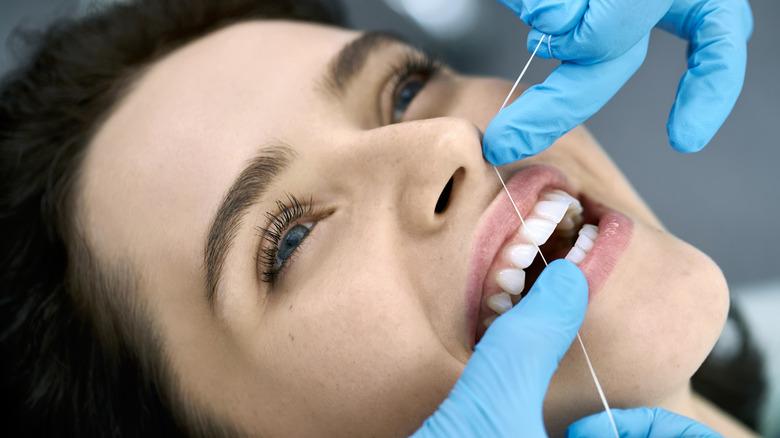What do your gums have in common with your gut? They both have their own constellation of bacteria that keep them healthy and help your body function properly. If your gut bacteria aren’t balanced, you might experience digestive issues. Taking a probiotic could help get things back on track. But when the levels of healthy bacteria that live on your gums get too low, your mouth may not be the only part of your body that suffers the consequences.
The biggest reason that adults lose healthy teeth is that their gums become damaged by periodontal disease (via Harvard Health Publishing). This happens when disease-causing bacteria outnumber the healthy bacteria on our gums (via Mayo Clinic). Poor dental hygiene and even certain medicines can create the perfect environment for unhealthy bacteria to thrive. Our immune system responds to these invaders by sending in white blood cells to fight off the germs. Unfortunately, the white blood cells don’t just damage the bad bacteria. They can also harm healthy gum tissue, which leads to diseased gums.
These diseases are linked to bad gums

There are a number of other health conditions that researchers have linked to periodontal disease. People with unhealthy gums are at higher risk for cardiovascular disease, diabetes, complications during pregnancy, and diabetes, among other things (via Harvard Health Publishing). However, it’s not clear whether gum disease causes these other conditions, or if people that happen to have these conditions just don’t take good care of their gums. Either way, periodontal disease and the related conditions all have one thing in common: inflammation. That’s why it’s important if you have any of the linked conditions to take especially good care of your teeth and gums.
Regular dental visits to assess the health of your teeth and gums should be a part of your oral hygiene practice. Brushing twice a day and flossing can help remove trapped pieces of food that can become breeding grounds for unhealthy bacteria (via Mayo Clinic). Reducing your sugar intake can also keep bacteria from wreaking havoc on your gums. If you suspect you may have signs of gum disease, visit a dentist who can do some testing to determine your gum health and recommend the best course of action moving forward.




